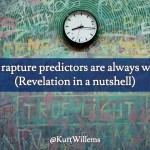Several days ago I began a discussion on the title: “Groans From Within.” Many in the church have misrepresented key passages of Scripture that are often thought to refer to a disembodied afterlife. A passage in the bible that is often misinterpreted is found at the end of Philippians chapter 3. The key phrase in this passage states, “Our citizenship is in heaven.” Moffatt translates this as: “we are a colony of heaven.”[1] This passage of Scripture has been read as having to do with believers ultimately hoping to meet in heaven. Matthew Henry stated: “Believers make Christ all in all, and set their hearts upon another world…and hope to meet shortly in heaven.”[2] Going to the homeland of heaven is understood also by commentator John Phillips:
Right now we are pilgrims and strangers in a foreign land. This world is not our final home. We are here as Heaven’s ambassadors. Every night we pitch our tent a day’s march nearer home.[3]
The implication of this passage may be different than many have assumed.[4] Being a citizen of heaven or, as Dr. Gordon Fee points out, of the “commonwealth” of heaven has Roman Empire overtones. Rome was the capital city of the entire Empire in the first century. Philippi, having been a colony of people under Roman rule in Macedonia, would have understood what it was to be of the commonwealth of Rome, and therefore would also have understood the implication of the Apostle’s language.[5] If life were to become difficult or if a person living in Philippi would have decided to retire, they would have by no means decided to abandon where they had spent their entire life in order to escape to the mother city. The emperor would also have no desire for them to move to the capital city where he was. Colonies such as Philippi were Rome’s extension into Northern Greece. If the Philippians would find themselves under attack by enemies of Rome, the emperor himself would come from Rome to deliver them from their iniquities and thus reestablish the colony as a true Roman presence where they already had been living.
This reestablishing of the people in Philippi is paralleled with our future bodily resurrection. Paul continues his look at our citizenship of the mother city of heaven: “from heaven we await a savior, the Lord Jesus Christ, who will change our lowly body to be like his glorious body.” In other words, Jesus will come from heaven to renew all things on earth and will resurrect His people and establish them to the glory that was lost in the “fall.” The passage is not about escape, but of Christ bringing forth the benefits of heavenly commonwealth by restoring justice to the universe and resurrecting His people. This will come to pass in the new heavens and new earth as described in Revelation chapter twenty-one.[6]
I am curious to hear your thoughts on this passage and the concept of afterlife over-all. How have you heard this passage taught in your church context? What do you think of this proposed interpretation?
________________________________________________________
[1]Wright, New Heavens, New Earth: The Biblical Picture of Christian Hope, 8.
[2]Matthew Henry, “Philippians,” in Matthew Henry’s Concise Commentary on the Bible [book on-line] (n.p.: Public Domain, n.d.); available from http://www.biblegateway.com/resources/commentaries/index.php?action=getCommentaryText&cid=58&source=2&seq=i.57.3.2; Internet.
[3]John Phillips, Exploring Ephesians and Philippians, 3d ed. John Phillips Commentary Series (Grand Rapids: Kregel Academic & Professional, 2002), 149.
[4]Wright, New Heavens, New Earth: The Biblical Picture of Christian Hope, 8.
[5]Fee, Dr.Gordon D., Paul’s Letter to the Philippians, The New International Commentary on the New Testament (Grand Rapids: Wm. Be Eerdmans Publishing Co., 1995), 379.
[6]Wright, New Heavens, New Earth: The Biblical Picture of Christian Hope, 8.











